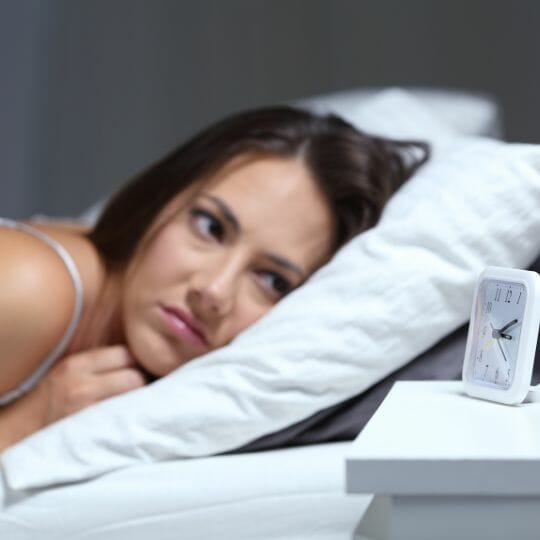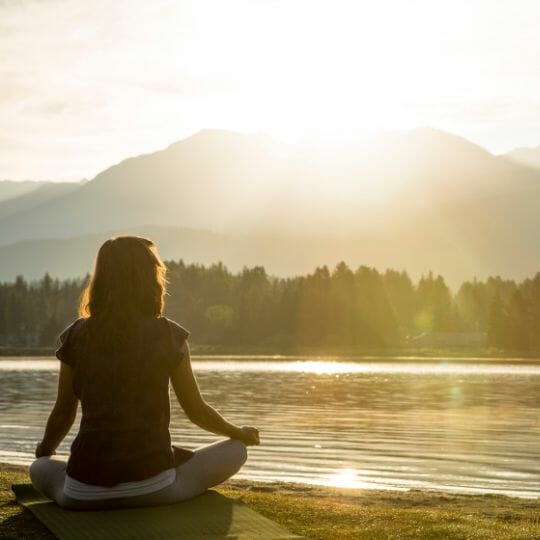
If you’re like me, sleep can be hit and miss at times and getting enough sleep can become a drain that affects your performance and productivity. In this episode, we’ll cover a few sleep hacks recommended by leading neurobiologists that can help you improve your chance of falling asleep and staying asleep.
In the last episode of this podcast, we discussed sleep chronobiology and its impact on health and well-being, along with a few simple tips to identify your chronobiology and how to align your routines to your personal type.
Now let’s get specific with some hacks!
Many recent (2022) journal articles have revealed how ocular light exposure – that is, light entering the eyes – affects our circadian rhythms and sleep, endocrine function and cognitive function, which in turn influence human health and wellbeing.
This conversation is partly based around “melanopic light”, which describes the way that blue light frequencies restrict melatonin production in your body until after dusk, after which time melatonin washes through the body to help you sleep.
The recent advances in our understanding of the relationship between light exposure and sleep have led to the development of new standards and practices. By understanding how different light sources and timing of exposure work, neurobiologists have been able to develop recommendations for improving sleep quality and quantity.
Let’s take a look at some of the hacks that you can use, for free, to improve your sleep.
An interesting hack is the recommendation for morning sun exposure (outdoors) which can mitigate any undesirable effects of indoor light exposure (during the day and at night) so that you can wind down more easily and sleep better.
We also need to dim the lights in our houses. Recent advances in our understanding of circadian rhythms mean that light manufacturers have been able to produce blue light components so that artificial lighting systems in our homes and offices are very similar to actual daylight.
But while this is great for productivity during the day, it is not so good at night when we want to wind down and fall asleep. In that sense, after sunset, the experts recommend dimming the lights in your home, in the evening at least 3 hours before bedtime. This reduces the amount of light entering your eyes and helps allow the melatonin wash to occur.

This also applies to electronic devices. Televisions, computer screens, tablets or mobile phones all emit blue light and are often close to your eyes, so turning them off around sunset might help you to fall asleep and stay asleep.
While we’re talking about sunset, one interesting study showed that when you couple daytime outdoor light exposure with early evening light exposure (e.g. sunset), it can help to decrease the sleep disruptive effects of nighttime light exposure.
And if you have bright lights on late at night, you will suppress melatonin, the hormone that helps you relax and feel sleepy, which obviously affects your quality and duration of sleep.
Aside from light, there are other things that can improve your ability to fall asleep and stay asleep.
Food and exercise can affect your ability to fall asleep.
People who are early risers (see episode 206) might do better with an earlier dinner, exercising earlier in the day and minimising socialising at night so as not to disrupt sleep.
In contrast, people who are night owls (see episode 206) could eat later without disrupting sleep but might need a lighter dinner, and to finish exercise before 7pm so as not to disrupt sleep.
Otherwise, and more generally, alcohol intake at night might help you fall asleep but might wake you up between 1 – 3am.
For some people, a high-carb meal (more specifically, higher in simple carbs) might delay sleep onset – in other words, it takes longer to fall asleep – or cause them to wake up hungry.
Similarly, caffeine or other stimulants after 3pm might disrupt sleep in some people, as it takes 3 – 15 hours to metabolise and excrete caffeine.
A heavy meal at night or overeating at night often disrupts sleep. Either can cause indigestion, heartburn or simple discomfort before bed or during sleep. That’s because, during sleep, our digestive processes slow down but can also create competition for resources in the body if you have an undigested meal in your stomach.
Eating a heavy meal or too much food may cause you to wake up the next day without an appetite or even feeling heavy or sluggish because you’re still working through last night’s meal.

The remedy for this is simple – and twofold:
The science shows that inadequate daytime light exposure is as detrimental as too much electric light exposure at night, with both of these having adverse effects on your sleep, circadian rhythms and health outcomes.
So, in order to set yourself up for a good night’s sleep, the experts recommend that you get outdoors and get daytime light exposure within 30 – 60 minutes of waking up, if possible during the day, and also around sunset.
During the day (before sunset), aim for at least 2.5 hours of bright light exposure including your early morning exposure, and another hour in the late afternoon or evening.
In terms of light exposure, while you’re asleep, the experts recommend that your sleep environment is as dark as possible. If you do need to get up for the bathroom during the night, the recommended
maximum exposure to light is 10 lux (which is a unit of measure of light). You can download an app on your phone that measures light as a rough guide to help you determine exposure.
That aside, anxiety and worry can add to sleep issues. I have discussed this extensively in other episodes but it’s worth mentioning here – get some help, keep a worry diary and/or get on top of your task list to help you sleep easy at night.
Having some light, fun activities that aren’t too stimulating in the early evening can help you switch off!
Light exposure for shift workers is still an area of study and a challenge that neurobiologists haven’t yet been able to solve.
At this time, there is evidence that increasing melanopic light levels at work (e.g. office lighting) can improve alertness, as measured subjectively (e.g. questionnaire) and/or objectively, but this requires further study in the shift work population.
In any case, I speculate that even shift workers can create some improvements in sleep, and we will look at that in another episode in more detail.
For now, let’s assume that eating and exercise can be modified to improve the chance of a good night’s sleep, and further, blocking out curtains and getting the timing of light exposure right might help to create a rhythm that facilitates sleep.

In the previous episode of this podcast, I talked about determining your sleep chronotype – in other words – the time you wake up and the time you go to bed. Whether you’re an early riser, a night owl or an in-betweener, being consistent with wake and sleep times can help you establish a regular daily light-dark cycle which can further benefit sleep, cognition and health.
And as described earlier in this episode, getting outdoor light exposure soon after waking and again late afternoon can help you to sleep more soundly, and wake refreshed.
And as described earlier in this episode, getting outdoor light exposure soon after waking and again late afternoon can help you to sleep more soundly, and wake refreshed.
If you want to sleep well, also consider the timing, quantity and quality of food and exercise in the context of your chronotype – nothing within 3 hours of sleep, and reducing or avoiding alcohol, caffeine and high glycemic foods or heavy meals.
Think about switching off devices after sunset and dimming your house lights.
There is so much coming out about sleep right now, and today’s summary of research includes a few tips to help you manage your sleep better.
Brown TM, Brainard GC, Cajochen C, Czeisler CA, Hanifin JP, et al. (2022) Recommendations for daytime, evening, and nighttime indoor light exposure to best support physiology, sleep, and wakefulness in healthy adults. PLOS Biology 20(3): e3001571. https://doi.org/10.1371/journal.pbio.3001571
Understanding who you are and what you need will allow your business to thrive! If you’re truly ready to break old habits and get out of the rut I encourage you to check out the Habitology membership.
Learn more here: